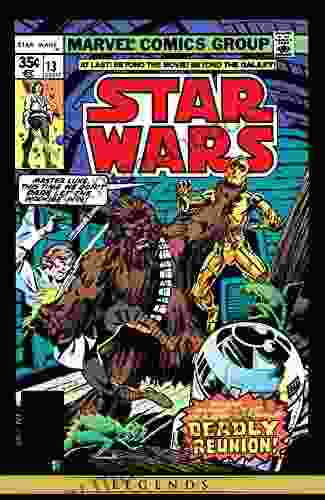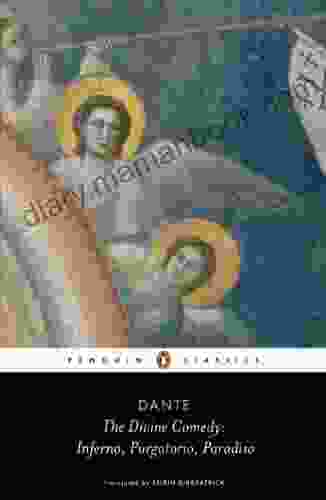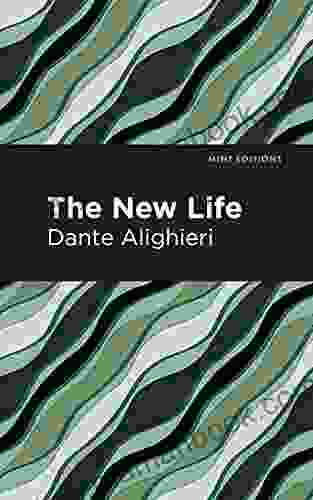The Divine Comedy: Inferno, Purgatorio, Paradiso (Penguin Classics): A Journey Through the Afterlife

The Divine Comedy is a masterpiece of Italian literature and one of the most important works in Western literature. Written by Dante Alighieri in the early 14th century, the poem tells the story of Dante's journey through the afterlife, accompanied by the Roman poet Virgil. The poem is divided into three parts: Inferno, Purgatorio, and Paradiso. Inferno describes Dante's journey through hell, where he encounters sinners of all kinds, from the lustful to the treacherous. Purgatorio describes Dante's journey through purgatory, where he encounters souls who are being purified from their sins. Paradiso describes Dante's journey through heaven, where he encounters saints and angels.
4.6 out of 5
| Language | : | English |
| File size | : | 3351 KB |
| Text-to-Speech | : | Enabled |
| Screen Reader | : | Supported |
| Enhanced typesetting | : | Enabled |
| X-Ray | : | Enabled |
| Print length | : | 736 pages |
Inferno
The Inferno is the first part of The Divine Comedy. It describes Dante's journey through hell, where he encounters sinners of all kinds. The Inferno is divided into nine circles, each of which is inhabited by a different type of sinner. The first circle, Limbo, is inhabited by the souls of those who were not baptized before they died. The second circle, Lust, is inhabited by the souls of those who were overcome by lust in life. The third circle, Gluttony, is inhabited by the souls of those who were overcome by gluttony in life. The fourth circle, Greed, is inhabited by the souls of those who were overcome by greed in life. The fifth circle, Wrath, is inhabited by the souls of those who were overcome by wrath in life. The sixth circle, Heresy, is inhabited by the souls of those who were heretics in life. The seventh circle, Violence, is inhabited by the souls of those who were violent in life. The eighth circle, Fraud, is inhabited by the souls of those who were fraudulent in life. The ninth circle, Treachery, is inhabited by the souls of those who were treacherous in life.
Purgatorio
The Purgatorio is the second part of The Divine Comedy. It describes Dante's journey through purgatory, where he encounters souls who are being purified from their sins. The Purgatorio is divided into seven terraces, each of which represents a different type of sin. The first terrace, Pride, is inhabited by the souls of those who were overcome by pride in life. The second terrace, Envy, is inhabited by the souls of those who were overcome by envy in life. The third terrace, Wrath, is inhabited by the souls of those who were overcome by wrath in life. The fourth terrace, Sloth, is inhabited by the souls of those who were overcome by sloth in life. The fifth terrace, Avarice, is inhabited by the souls of those who were overcome by avarice in life. The sixth terrace, Gluttony, is inhabited by the souls of those who were overcome by gluttony in life. The seventh terrace, Lust, is inhabited by the souls of those who were overcome by lust in life.
Paradiso
The Paradiso is the third part of The Divine Comedy. It describes Dante's journey through heaven, where he encounters saints and angels. The Paradiso is divided into nine spheres, each of which represents a different planet. The first sphere, the Moon, is inhabited by the souls of those who were not baptized before they died. The second sphere, Mercury, is inhabited by the souls of those who were active in life. The third sphere, Venus, is inhabited by the souls of those who were in love in life. The fourth sphere, the Sun, is inhabited by the souls of those who were wise in life. The fifth sphere, Mars, is inhabited by the souls of those who were martyrs in life. The sixth sphere, Jupiter, is inhabited by the souls of those who were just in life. The seventh sphere, Saturn, is inhabited by the souls of those who were contemplative in life. The eighth sphere, the Fixed Stars, is inhabited by the souls of those who were triumphant in life. The ninth sphere, the Primum Mobile, is inhabited by the souls of those who were blessed in life.
The Divine Comedy is a masterpiece of Italian literature and one of the most important works in Western literature. It is a complex and challenging poem, but it is also a rewarding one. The poem offers a unique insight into the human condition and the nature of the afterlife. It is a work that has inspired countless artists and writers over the centuries, and it continues to be read and enjoyed by people around the world.
4.6 out of 5
| Language | : | English |
| File size | : | 3351 KB |
| Text-to-Speech | : | Enabled |
| Screen Reader | : | Supported |
| Enhanced typesetting | : | Enabled |
| X-Ray | : | Enabled |
| Print length | : | 736 pages |
Do you want to contribute by writing guest posts on this blog?
Please contact us and send us a resume of previous articles that you have written.
 Top Book
Top Book Novel
Novel Fiction
Fiction Nonfiction
Nonfiction Literature
Literature Paperback
Paperback Hardcover
Hardcover E-book
E-book Audiobook
Audiobook Bestseller
Bestseller Classic
Classic Mystery
Mystery Thriller
Thriller Romance
Romance Fantasy
Fantasy Science Fiction
Science Fiction Biography
Biography Memoir
Memoir Autobiography
Autobiography Poetry
Poetry Drama
Drama Historical Fiction
Historical Fiction Self-help
Self-help Young Adult
Young Adult Childrens Books
Childrens Books Graphic Novel
Graphic Novel Anthology
Anthology Series
Series Encyclopedia
Encyclopedia Reference
Reference Guidebook
Guidebook Textbook
Textbook Workbook
Workbook Journal
Journal Diary
Diary Manuscript
Manuscript Folio
Folio Pulp Fiction
Pulp Fiction Short Stories
Short Stories Fairy Tales
Fairy Tales Fables
Fables Mythology
Mythology Philosophy
Philosophy Religion
Religion Spirituality
Spirituality Essays
Essays Critique
Critique Commentary
Commentary Glossary
Glossary Bibliography
Bibliography Index
Index Table of Contents
Table of Contents Preface
Preface Introduction
Introduction Foreword
Foreword Afterword
Afterword Appendices
Appendices Annotations
Annotations Footnotes
Footnotes Epilogue
Epilogue Prologue
Prologue Fenwick W English
Fenwick W English Dante Alighieri
Dante Alighieri Courtland Thompson
Courtland Thompson Brian Wood
Brian Wood Josie Brown
Josie Brown Tomson Highway
Tomson Highway Robbie August
Robbie August Ali Wentworth
Ali Wentworth R S Penney
R S Penney J Tyler Fovel
J Tyler Fovel Laura Fleming
Laura Fleming Aleksandar Miljkovic
Aleksandar Miljkovic Lisa Anne Curlin
Lisa Anne Curlin Barre Toelken
Barre Toelken Zane Mitchell
Zane Mitchell Portia Macintosh
Portia Macintosh J S Williams
J S Williams Empress Simone
Empress Simone Carol Anderson
Carol Anderson Daneyal Anis
Daneyal Anis
Light bulbAdvertise smarter! Our strategic ad space ensures maximum exposure. Reserve your spot today!

 Guy PowellUnveiling the Power of Differentiated Curriculum and Instruction for Advanced...
Guy PowellUnveiling the Power of Differentiated Curriculum and Instruction for Advanced...
 Glen PowellNaruto Vol 57: Battle Naruto Graphic Novel: A Thrilling Dive into the Shinobi...
Glen PowellNaruto Vol 57: Battle Naruto Graphic Novel: A Thrilling Dive into the Shinobi...
 Clark CampbellStar Wars: A Saga of Galactic Battles, Epic Characters, and Cinematic History...
Clark CampbellStar Wars: A Saga of Galactic Battles, Epic Characters, and Cinematic History... Pete BlairFollow ·6.9k
Pete BlairFollow ·6.9k Holden BellFollow ·8.5k
Holden BellFollow ·8.5k Harry CookFollow ·5k
Harry CookFollow ·5k Adrien BlairFollow ·10k
Adrien BlairFollow ·10k Hank MitchellFollow ·8.7k
Hank MitchellFollow ·8.7k Braden WardFollow ·5.5k
Braden WardFollow ·5.5k Jan MitchellFollow ·2.4k
Jan MitchellFollow ·2.4k Chuck MitchellFollow ·2.2k
Chuck MitchellFollow ·2.2k

 Jorge Luis Borges
Jorge Luis BorgesThe Truth About the 15 Qualities That Men Secretly Admire...
Every woman wants to be loved and...

 Francisco Cox
Francisco CoxPlague Ship: Unraveling the Mystery of the Oregon Files
The Oregon Files, a collection of classified...

 Rudyard Kipling
Rudyard Kipling101 Strategies to Make Academic Vocabulary Stick: A...
Academic vocabulary is an...

 Fletcher Mitchell
Fletcher MitchellPractitioner Guide for Cities, Regions, and Countries:...
The world is...

 Emilio Cox
Emilio CoxOptimization and Security Challenges in Smart Power Grids
Smart power grids (SPGs) are emerging as a...

 Chandler Ward
Chandler WardMiles Davis and the Civil Rights Movement in America: A...
Miles Davis, the iconic jazz...
4.6 out of 5
| Language | : | English |
| File size | : | 3351 KB |
| Text-to-Speech | : | Enabled |
| Screen Reader | : | Supported |
| Enhanced typesetting | : | Enabled |
| X-Ray | : | Enabled |
| Print length | : | 736 pages |






